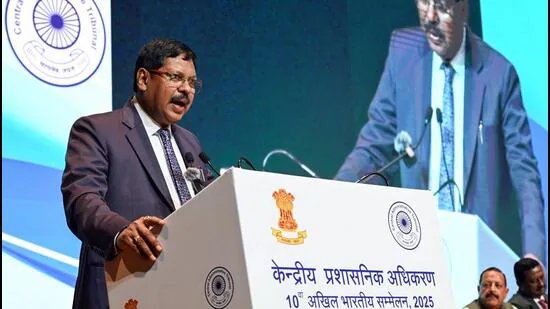Disturbing Incident at Supreme Court: Lawyer Attempts to Assault Chief Justice
In a shocking turn of events, a 71-year-old lawyer from Delhi attempted to hurl his shoe at Chief Justice of India (CJI) Bhushan R. Gavai during court proceedings on Monday. The incident, which occurred in the Supreme Court, has sparked widespread condemnation from political leaders and legal associations alike, raising questions about the state of decorum and respect within the Indian judiciary.
The Incident Unfolds
The dramatic episode took place around 11:35 AM in Court No. 1, where Rakesh Kishore, a temporary member of the Supreme Court Bar Association (SCBA) since 2011, suddenly approached the CJI’s dais. Eyewitnesses reported that Kishore attempted to remove his shoe, a gesture often associated with protest and disrespect, before being swiftly restrained by security personnel. As he was escorted out, he shouted, “Sanatan ka apman nahi sahenge” (We will not tolerate any insult to Sanatan), indicating that his actions were motivated by a perceived affront to his beliefs.
Despite the chaos, CJI Gavai remained composed, instructing court officials to “just ignore” the incident and urging lawyers to continue with the day’s proceedings. “These things do not affect me,” he stated, demonstrating a remarkable level of calm in the face of provocation.
Political and Legal Reactions
The incident has drawn sharp criticism from various quarters. Prime Minister Narendra Modi expressed his outrage, stating, “The attack on him… has angered every Indian. There is no place for such reprehensible acts in our society.” He commended Justice Gavai for his dignified response to the situation.
Sonia Gandhi, chairperson of the Congress Parliamentary Party, labeled the act as an “assault” not only on the CJI but also on the Constitution itself. Her sentiments were echoed by leaders across the political spectrum, including Tamil Nadu Chief Minister MK Stalin, who described the act as “shameful” and indicative of a lingering oppressive mindset in society.
The Bar Council of India (BCI) took immediate action by suspending Kishore from practice, stating that his conduct was “inconsistent with the dignity of the court and BCI rules.” A disciplinary inquiry is set to follow, emphasizing the seriousness with which the legal community views such breaches of decorum.
Context and Background
This incident is not an isolated one but rather part of a troubling trend of increasing hostility towards judicial figures in India. The judiciary, a cornerstone of democracy, has faced various challenges, including public outbursts and threats against judges. The rise of social media has amplified these tensions, allowing misinformation and emotional reactions to spread rapidly.
Kishore’s actions were reportedly fueled by his discontent over remarks made by the CJI during a recent hearing concerning the restoration of a beheaded Lord Vishnu idol at the Javari temple in Khajuraho, Madhya Pradesh. The Supreme Court had declined to entertain a petition related to the matter, stating it fell under the jurisdiction of the Archaeological Survey of India (ASI). CJI Gavai’s comments during that hearing, which included a suggestion for the petitioner to pray for divine intervention, were misconstrued on social media, leading to public outrage.
Solicitor General Tushar Mehta highlighted the dangers of misinformation, noting that social media reactions can often be disproportionate to the original statements made. Senior advocate Kapil Sibal added that the legal community suffers daily from the consequences of this “unruly horse” of social media.
The Legal Community Responds
The Supreme Court Bar Association and the Supreme Court Advocates-on-Record Association (SCAoRA) both condemned Kishore’s actions. The SCBA emphasized that Kishore was merely a temporary member and that they were considering further disciplinary measures. SCAoRA described the incident as “unbecoming of a member of the Bar,” stressing that it undermines the mutual respect essential for the relationship between the Bench and the Bar.
Kishore’s Perspective
In a statement to the media, Kishore expressed no regret for his actions, claiming he was guided by a “divine force.” This assertion raises questions about his mental state and the motivations behind his extreme actions. Family members of Kishore have reportedly expressed anger and embarrassment, although they have refrained from making public comments.
Conclusion
The incident involving Rakesh Kishore serves as a stark reminder of the challenges facing the Indian judiciary in maintaining decorum and respect. As political leaders and legal associations unite in condemnation, the broader implications of such actions on the rule of law and public trust in the judiciary cannot be overlooked. The Supreme Court, a symbol of justice and democracy, must navigate these turbulent waters with both firmness and grace, ensuring that respect for the law prevails in the face of adversity.











